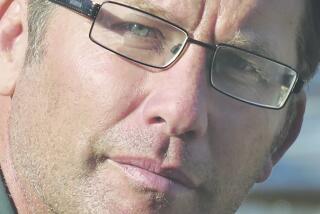Floating Down the River : PLATTE RIVER, <i> By Rick Bass (Houghton Mifflin/Seymour Lawrence: $19.95; 145 pp.)</i>
People who admire Rick Bass’ resplendent 1989 story collection, “The Watch,” as well as his several intervening nonfiction books on what the publishers call “the outdoors,” have been looking forward to his new book of fiction with unusual interest. Some may be gunning for him, a writer who makes his reputation all too easily with a single book, but most of us are simply eager. We want to see where Bass’ jumpy, oddly lyrical voice--a voice entirely his own--takes him a year or two down the road; we want to see if he’s getting deeper to the truths of his slightly fractured sense of reality, whatever those truths may be. We want to see if he’s still putting it all on the line, risking all, every time he writes.
“Platte River,” a collection of three long stories, has now arrived, and it’s a fine book; it is a strong, visual, American book, enlivened by an unstudied masculine sensibility that this male reader, for one, finds distinctly refreshing. The title story is stunning; in my view, it’s the best single piece Bass has written to date, more plainly and empathetically told than most of his work, a very moving story about an old football player named Harley (how’s that for maleness?).
But perhaps the larger questions about Bass’ career and the direction of his thinking remain unanswered in this book. Huge themes--the wilderness, purification and redemption, the use of sacrament--are planted all through these stories, but at this point Rick Bass still seems to be sowing more than he is reaping. His argument with the world can feel a little incoherent. He’s got plenty of time, and he’s given us a thoroughly enjoyable evening of reading, but under the smooth flow of his marvelous prose, “Platte River” sometimes loses its way.
Many of the large themes are put in play by the opening story, “Mahatma Joe.” Mahatma Joe Krag is a churlish old evangelist, who came to a remote valley in Montana years ago looking for converts. Though he failed totally in his primary mission, he has remained in this little Eden largely to take the fun out of life for everyone else. Bass is wonderful about the valley, “a park, green and forever,” and about the vivid assortment of types and pilgrims that it attracts. Mahatma Joe, one of those types, is nevertheless determined to wreck it: “He wanted the town to have rules, ever more rules”; he writes venomous letters and drafts ordinances, imagining the valley as “a new place to get it right.”
With his lyrical sense of place and his fierce protectiveness of the wild, Bass is on home ground here. The conflict, with all its comedies and magical turns, is nicely conceived. But I have to say that as the story evolves, I don’t know who or what is winning the battle. Joe’s final dizzy project, carried out in moonlight, is to plant vegetable gardens on some of the valley’s creek banks. “What was once a meadow was now a cultivated garden, ordered and perfect,” the narrator tells us, but is this more rule making, or has Joe’s mission been finally subverted by the rich soil of the valley?
What the story lacks is the focused passion of Bass’ splendidly raw essay on many of the same themes, “The Ninemile Wolves.” There’s also a large serving of theological images here--baptism, Calvary--but no examination of what they mean for either the faithful or the faithless. Instead, “Mahatma Joe” ends, for me, in confusion.
Vastly more successful are the other two stories, “Field Events” and “Platte River.” The former opens with a black-bearded giant of a man emerging primevally from a frigid river, while two hulking and athletic brothers spy from behind the protection of a boulder. The giant, named A.C. (the initials could stand for a lot of things, but I like Allis Chalmers) happens to be swimming naked, miles upstream to his house, with the painter of a canoe in his teeth. The brothers, high school track and field stars, decide, wonderfully, that A.C. is the discus thrower of their dreams.
“Field Events” turns into a lovely fable about vigor and youth. “So young! So young!” exclaims the narrator about these boys, the brothers and A.C., and about the sister, Lory, whom A.C. falls in love with. Through one year A.C. trains at the discus, and he throws farther and farther, as if finally, to give it one last toss around the circumference of the earth. “That’s over 126,720,000 feet,” one of the brothers exclaims. “How far’d you throw today, A.C.?”
From the water came A.C., and to the water he returns. “In the spring . . . after the snows melted and the rivers began to warm . . . he began to swim again, but with Lory this year.” Water--cold spring run-off water--has mystical qualities for Bass, and here he is quite certain of himself. It’s a motif from “Mahatma Joe,” and from “Platte River,” being lost and drowned, a sinner, then swimming for the air; being purified by the shock of icy water; finding answers in the secrets below the surface.
Thus in “Platte River,” the former pro football player, Harley, living in isolation on the Canadian border with a woman who is about to leave him, finds himself doing a two-day lecture gig at a small rural art college. It’s a scam cooked up by the running back Harley used to block for in college, who now teaches English. Bass gives us the dispirited faculty at this college in the woods, the sad marriages, the suicidal colleague, the rusted-out Toyota’s they all drive, and by the end of the predictable evening, the men end up in perhaps the only place on earth that they trust: casting for steelhead salmon on the banks of the Platte River. Maybe it’s silly, but that’s what they do.
Perhaps none of these men can be saved: Harley, or the suicidal English prof, or the former running back with his failing marriage. Perhaps manhood, as a positive value, cannot be saved, in this century anyway. But I liked the men in this story and the dogged efforts they were making, and if I had my choice, I’d choose fishing with them over a lot of fussier alternatives. I feel the same way about this book. I’m not satisfied by it, totally, but I liked it, I felt comfortable with it, and I’d choose Rick Bass over just about any other writer at work today.
More to Read
Sign up for our Book Club newsletter
Get the latest news, events and more from the Los Angeles Times Book Club, and help us get L.A. reading and talking.
You may occasionally receive promotional content from the Los Angeles Times.









